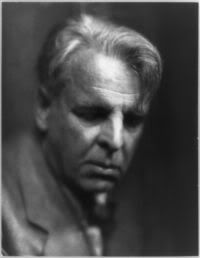
William Butler Yeats
William Butler Yeats was born in Dublin, Ireland in the year 1865. Yeats began writing poetry during his years at Erasmus Smith High School around 1881, and had his first poems publish in 1865 in the Dublin University Review. Yeats' style has been commonly associated with the Romantic movement and the Gaelic Revival. Early in his career as a poet, his chief influences were William Blake and Percy Bysshe Shelley. His style was heavy on the incorporation of mysticism and old folklore. As well as being known as a poet, Yeats was also well known as a playwright and essayist, and helped to found Dublin's Abbey Theatre, as well as the Irish National Theatre Society.
Yeats' poems seem to draw mainly on his love for the land of Ireland, as well as his romantic yearning for days gone by. He writes frequently of faded beauty and the effects of age. Yeats was also a fervent Irish nationalist, which is reflected in much of his work as well.
The Lake Isle of Innisfree (1893)
I will arise and go now, and go to Innisfree,
And a small cabin build there, of clay and wattles made:
Nine bean-rows will I have there, a have for the honey-bee,
And live alone in the bee-loud glade.
And I shall have some peace there, as peace comes dropping slow,
Dropping from the veils of the morning to where the cricket sings;
And midnight's all a glimmer, and noon a purple glow,
And evening full of the linnet's wings.
I will arise and go now, for always night and day
I hear lake water lapping with low sounds by the shore;
While I stand on the roadway, or on the pavements gray,
I hear it in the deep heart's core.
In this poem, Yeats reveals his desire for a simpler kind of life than the one he leads. He wishes to leave wherever it is he's at, and go to the lake isle of Innisfree. When he arrives there, he wishes to lead a simple kind of life in the woods, immersed in his surroundings and in the peace of nature. In contrast he feels trapped by the city, and it's "pavements gray", and by the roadways of the metropolis in which he resides. In spite of all this, he can still hear the sound of the water on the lake calling to him.
This poem was written by Yeats when he was living in London in the 1890s. Surely London in the 1890s was not a very serene place, and so Yeats wanted to write about someplace better, where he wished he was. He also describes a rural lifestyle that was probably much simpler than the sort of lifestyle one would live in London. Though he understands the reality of where he is, he can feel it in his "deep heart's core" that he wishes he were someplace else. Someplace simple and peaceful.
Sailing to Byzantium
"That is no country for old men. The young
In one another's arms, birds in the trees
- Those dying generations - at their song,
The salmon-falls, the mackerel-crowded seas,
Fish, flesh, or fowl, commend all summer long
Whatever is begotten, born, and dies.
Caught in that sensual music all neglect
Monuments of unageing intellect.
An aged man is but a paltry thing,
A tattered coat upon a stick, unless
Soul clap its hands and sing, and louder sing
For every tatter in its mortal dress,
Nor is there singing school but studying
Monuments of its own magnificence;
And therefore I have sailed the seas and come
To the holy city of Byzantium.
O sages standing in God's holy fire
As in the gold mosaic of a wall,
Come from the holy fire, perne in a gyre,
And be the singing-masters of my soul.
Consume my heart away; sick with desire
And fastened to a dying animal
It knows not what it is; and gather me
Into the artifice of eternity.
Once out of nature I shall never take
My bodily form from any natural thing,
But such a form as Grecian goldsmiths make
Of hammered gold and gold enamelling
To keep a drowsy Emperor awake;
Or set upon a golden bough to sing
To lords and ladies of Byzantium
Of what is past, or passing, or to come."
Comments (0)
You don't have permission to comment on this page.